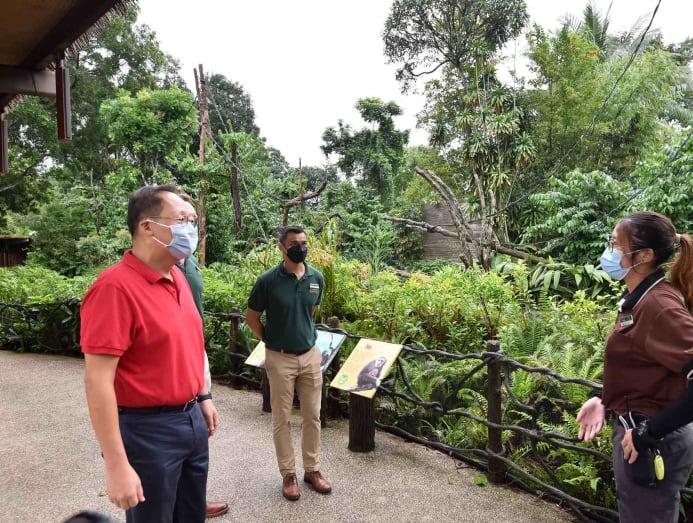'Promising signs' for tourism-related sectors, but pace of recovery remains uncertain: Tan See Leng
SINGAPORE: There are some promising signs of recovery for tourism-related sectors, but the pace remains uncertain as Singapore’s border reopening is dependent on the COVID-19 pandemic situation globally, said Manpower Minister Tan See Leng on Wednesday (Aug 25).
Dr Tan was speaking at a press conference held at the Singapore Zoo for the Ministry of Manpower’s (MOM) 24th Jobs Situation Report.
Responding to reporters' questions on the pace of recovery for the tourism and related sectors, Dr Tan said: “There are actually some promising signs … I think the airlines are beginning to open up routes. This resumption of travel between Germany and (Singapore) is one very good example.”
But the “difficult” question is when this would happen, and that it is hard to give a definitive answer now, said Dr Tan, who listed two caveats.
“The caveat is that while we have ... a high vaccination rate, not many countries have the same rate of vaccination as we do. So I think we need to be mindful of the risks,” he said.
“The other caveat is that the Delta variant doesn’t mutate into something even more virulent.”

On Aug 19, Transport Minister S Iswaran announced that Singapore will start vaccinated travel lanes with no need for quarantine for travellers with Germany and Brunei, signalling the start of Singapore's border reopening.
Earlier attempts to Singapore to start a travel bubble with Hong Kong, and talk of travel bubbles with other countries, had come to nothing.
Since the start of the COVID-19 pandemic early last year, border restrictions have meant a plunge in visitor arrivals to Singapore. In 2020, there were 2.7 million visitors – a near 86 per cent decrease from 2019’s more than 19 million visitors.
Industries relying on tourists, meetings and lifestyle services were badly affected and have had to accelerate digitalisation plans, and businesses have had to quickly pivot.
"NOT JUST UP TO SINGAPORE"
Ms Jeannie Lim, assistant chief executive of the policy and planning group at the Singapore Tourism Board (STB) said that she thinks recovery will still be “protracted” as it is hard to make up for the loss of tourism.
In 2019, tourism receipts reached a record high of S$27.7 billion, but this fell nearly 83 per cent to S$4.8 billion in 2020.
As of Aug 1, more than a million adult Singapore citizens have used their SingapoRediscovers Vouchers at least once, with about 1.4 million transactions that amounted to more than S$168 million in vouchers and cash payments on tourism bookings, STB said.
“I think it’s not just up to Singapore, as much as we are moving very much into our endemic roadmap, it's very much dependent on how other countries and how other jurisdictions are also managing their COVID-19 situation within their borders,” Ms Lim said.
She added that Singapore is in talk with many countries for travel lanes and arrangements, but these could take some time to materialise.
“I think more importantly we want to make sure it happens in a safe and calibrated manner even as we gear up our companies and our workforce to prepare reopening,” she said, adding that there are some tourism companies that have picked up hiring recently.
Many of these companies are looking for people with digital skills, she said, which is why government agencies have ramped up training in this and other areas that are in demand.
“Tourism has always been very high touch, but now we are introducing high tech as well … so how do people embrace technology to deliver deeper, more engaging customer experiences,” Ms Lim said.
Roles that are in demand include digital strategist, digital marketing executive or manager, and operations executive for digital solutions, MOM and WSG said in its Jobs Situation Report, which is focused on programmes to help firms in tourism and lifestyle services redesign jobs and train their workforce.
MORE CAREER CONVERSION PROGRAMMES
The report said that more than 3,100 workers have enrolled in career conversion programmes for the tourism and lifestyle services sector from January last year to mid-August 2021.
The workers came from more than 200 companies in sectors including the hotel industry, food services, the lifestyle sector and retail.
This is a 30-fold increase from 2019, when close to 110 workers from about 40 companies were in career conversion programmes. Another 1,400 workers are due to take part in the programme from now till December 2022.
Since January 2020, WSG has launched 18 new career conversion programmes for the tourism and lifestyle sectors, up from just five.
Next month, it will launch an enhanced career conversion programme for digital marketing tourism professionals following a WSG survey which found that many companies would like to improve their digital sales and marketing and lacked workers with these skills.
"This programme will help workers acquire digital sales and marketing skills to assume roles with better prospects," said Dr Tan.







